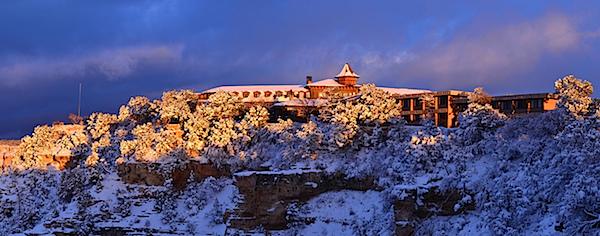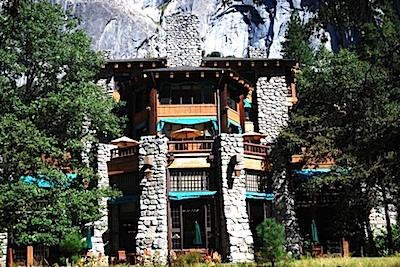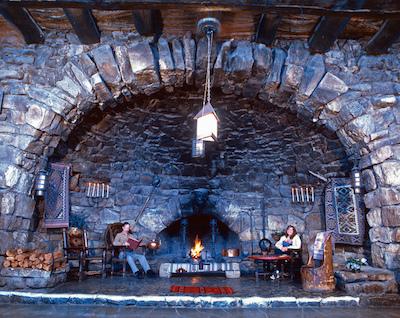
Xanterra Parks & Resorts has filed an application to trademark "El Tovar," and other lodging names on the South Rim of Grand Canyon National Park/NPS photo of El Tovar Hotel
Last fall, Xanterra Parks & Resorts was coming down to its last two months as concessionaire for the lodges and restaurants on the South Rim of Grand Canyon National Park. It had been unable to come to terms with the National Park Service over a new, 15-year pact that would take effect January 1, 2015, and had sued the agency over its contracting decisions. About the same time, Xanterra filed a slew of applications to trademark the names of those iconic lodges and restaurants covered by the contract.
Those applications, currently pending with the U.S. Patent and Trademark Office, come in the wake of news that Delaware North Co. had laid claim to trademarks to place names in Yosemite National Park, including that to The Ahwahnee Hotel, perhaps the grande dame of national park lodging.
Trademarking place names within the National Park System is not new for many products unrelated to the daily operations of a park. Old Faithful isn't just the name of a geyser, it's also tied to a gun. Denali is a national park in Alaska, and it's also a baby stroller and a medical device. Grand Teton National Park towers above Wyoming's western border, and "Grand Teton" is also a cheese and a vodka. But it's the trademarks taken out or applied for, some in recent months, on lodges and places within national parks that perhaps best underscore John Muir's belief that "nothing dollarable is safe."
Muir's full comment -- "Nothing dollarable is safe, however guarded. Thus the Yosemite Park, the beauty glory of California and the Nation, Nature's own mountain wonderland, has been attacked by spoilers ever since it was established, and this strife I suppose, must go on as part of the eternal battle between right and wrong." -- was made in 1908 in the wake of a move by the City of San Francisco to dam the Hetch Hetchy Valley in Yosemite National Park to create a reservoir for its water needs.
Leap ahead 106 years and Muir's fears are ringing loudly as concessions companies lay claim to trademarks for lodges they operate in the park and, at least in one case, place multi-million-dollar numbers to those trademarks if they lose the contract to operate those lodges.
Businesses have been making money off park names and places for decades. General Motors Corp. has taken names of parks -- Acadia and Denali, just to cite two -- and attached them to some of their vehicles. The Ballard Rifle & Cartridge Co. of Powell, Wyoming, received the "Old Faithful" trademark in 2008 for some of its firearms, while the Idaho Candy Co. trademarked some of its confections "Old Faithful" back in 1926.
Software companies have both trademarked park names and, in the case of Apple with its "Yosemite" operating system, simply affixed them to their products.

Delaware North maintains that it owns the trademark to The Ahwahnee Hotel, and won't relinquish it without compensation/Kurt Repanshek
In products unrelated to national parks, the use of park names, whether trademarked or not, might not outwardly pose a serious problem. But in the case of Delaware North Co. at Yosemite, Xanterra Parks & Resorts at Grand Canyon National Park, and the Grand Teton Lodge Co. in Grand Teton, the trademarking of place names and lodges could pose a threat to the historical integrity of the parks as well as a possible impediment to the Park Service's efforts to develop a competitive process for awarding concessions contracts, a process that should be in the best interests of the visiting public.
Delaware North (DNC) had garnered the most attention of late for its trademark claims to The Ahwahnee Hotel, Curry Village, the Wawona Hotel, and Badger Pass. It also received a trademark for "Bracebridge Dinner," a sumptuous year-end, yuletide feast with music and pagentry that has been conducted annually at The Ahwahnee since 1927.
When the Park Service last year prepared a prospectus for companies interested in running concessions in Yosemite, officials for Delaware North notified the agency that DNC had trademarks to various lodges and locations in Yosemite. If it lost the bidding for the 15-year concessions contract that begins in 2016, DNC would require the winning bidder, as part of its Leaseholder Surrender Interest, to pay $51 million for the right to those names. The concessionaire has said that when it acquired the Yosemite Park & Curry Co. in 1993, among the assets it acquired were the intellectual property, ie., the trademarks on place names to the lodges and Badger Pass.
Should the Park Service require that any concessionaire that succeeds Delaware North pay that company $51 million to retain the place names, or should a new concessionaire be given the option to avoid paying that fee by renaming those historic lodges and facilities, and so figuratively erase part of the park's history?
So far the Park Service has not officially recognized Delaware North's claim, but it has in the prospectus left open the door for renaming all the places to which the claim extends if another company wins the contract. As a result, for example, the hotel known since 1927 as "The Ahwahnee" could go by a different name.
At the same time, the Interior Department's Office of the Solicitor is looking into the matter to see if Delaware North can legally trademark those place names, which date back many decades and which Park Service officials consider part of the historical landscape and vernacular of the park.

Xanterra also has applied for a trademark to "Hermit's Rest."/NPS
A search of the U.S. Patent and Trademark Office shows that other concessionaires also have laid claims to names in other national parks. Xanterra Parks & Resorts, which last October announced its intent to sue the Park Service over its concessions contract, that same month filed an application to trademark the name "El Tovar," which is attached to the famous hotel on the South Rim of the canyon. Within two weeks of that application, Xanterra made similar applications to trademark the names of virtually all commercial businesses on, and below, the South Rim: "Phantom Ranch," "Bright Angel Lodge," "Kachina Lodge," "Yavapai Lodge," "Maswick Lodge," "Red Horse Cabin," "Arizona Room," "Lookout Studio," "Buckey O'Neill Cabin," "Thunderbird Lodge," "Trailer Village,""Hopi House," "Hermit's Rest," and "Desert View Watchtower."
All of those applicatons are pending while the patent office reviews them.
Xanterra officials could not be reached Sunday to explain why they applied for the trademarks at a time when they had little more than two months left on their concessions contract, and had not bid on the new pact.
In response to Xanterra's lawsuit, the Park Service argued that Xanterra was trying to thwart competition and that the concessionaire felt that its history on the South Rim entitled it to remain there. While the lawsuit is still pending, the Park Service and Xanterra have come to terms on a temporary one-year contract to allow the company to continue running the concessions while the Park Service works to award the longer term, 15-year contract.
Another park concessionaire, Grand Teton Lodge Co., back in August 2005 received a trademark to "Jenny Lake Lodge," an opulent lodge in the national park. The trademark was renewed in September, according to patent office records.



Comments
No delete option.
rmackie, not sure what you want to infer but bringing in millions of low skilled illegals to make the Chamber of Commerce and Democratic National Committee pleased wouldn't seem to improve the wage disparity but make it even wider.
Thomas Sowell, respected Stanford University Economist:
http://www.realclearpolitics.com/articles/2015/01/06/the_equality_racket...
ec,
NPS obligated an additional $58k to a consultant's contract in late November for this task:
"Yose004 Prospectus Development - Modify Task 4 to Add Intangible Property Appraisal"
Clearly, NPS believes DNC's claims might have merit.
http://www.usaspending.gov/search?form_fields=%7B%22search_term%22%3A%22...
For anyone interested in the original contract, one might peruse this:
https://archive.org/details/yosemiteconcessi00unit
The congressional hearings on the contract. Seems there were issues. But, discussed was the $61.5 million payment for all assets. Curry transferred all assets to the winning bidder (convoluted at best) but with a caveat: after 15 years, the assets would be owned by the US Government. I would assume that would include intangible assets, but I've only read about 1/3 so far, and no mention is made of intelletual property.
Yes, EC, I am sure the contract said "intangible" assets, but I don't agree it included any names. As an author, I can use the "names" of my country freely, but none of them "belongs" to me. Nor can the titles of my books be copyrighted. You want to call your book NATIONAL PARKS: THE AMERICAN EXPERIENCE? I can't stop you. In fact, recall "The American Experience" on PBS? It took them a good many years, as well, to shorten it to "American Experience."
The point is: Corporate "naming rights" have run amok of common law. I don't deny what the "old companies," now the "new companies," did for the national parks "years ago," but they still don't own the names that are now the common heritage of the country. And frankly, if they went out of business today--and we had to find our "services" outside the parks--that would be just fine with me. I am sick and tired of bozo billionaires feeding at the public trough--and calling it theirs. When I ran for mayor of Seattle, a "citizen" cautioned me that if we didn't give the billionaires what they want, they would leave town. Well, don't let the door hit you on the way out, I replied. We can't afford this nonsense anymore. Nor can our national parks.
Now, when you watch the Seattle Seahawks this Saturday, remember who built the stadium. The taxpayers did. Who sold the naming rights? The billionaires did. Who pocketed the profit? Not the taxpayers. I rest my case.
Not included place names, agreed. But to believe it didn't include the names of facilities and businesses defies both economic history and logic.
I am not a big fan of taxpayer funded stadiums. However, it is fantasy to ignore the contribution such stadiums make to the community. Does that offset the cost to build - I really don't know. But then, the citizens of Seattle voted to fund the project so I guess that is where they wanted their tax money to go.
The wealthy pay the most in federal income taxes because they have almost all the money (90% of all the income gains since the 2008 recession have gone to the top 1%). However, they pay a disproportionately smaller share of payroll taxes (the largest share of taxes for most people), sales taxes, state income taxes and federal excise taxes. A fair share for them would be the kind of share they used to pay--like in the economic boom years of the 1950s and 60s. And the rich also benefit from a federal income tax structure in which unearned income, such as capital gains and dividends, are taxed at half the top marginal rates paid by people who earn income by actually working.
Let's skip the Fox News talking points. Saying rich people pay the most in federal income taxes is like saying that oceans carry the most cruise ships--it's because that's where most of the water is.
Your claim would be closer to the truth if you were talking about federal income taxes. Rich people pay the most in federal income taxes because they have the most money (over 90% of the income gains since the 2008 recession have gone to the top 1%). However, rich people pay a disproportionately smaller share of payroll taxes (the biggest tax for most people), sales taxes, most state income taxes, gas taxes and other federal excises taxes. And the wealthy benefit by paying half the top marginal rate on capital gains, dividends and carried interest than paid on income earned by actually working.
What would be a fair share for the wealthy? The kind of tax rates in place during the economic boom years of the 1950s and 60s.
Let's skip the Fox News talking points. Saying rich people pay the most in federal income taxes is like saying cruise ships sail mostly in oceans. It's because that's where most of the water is.